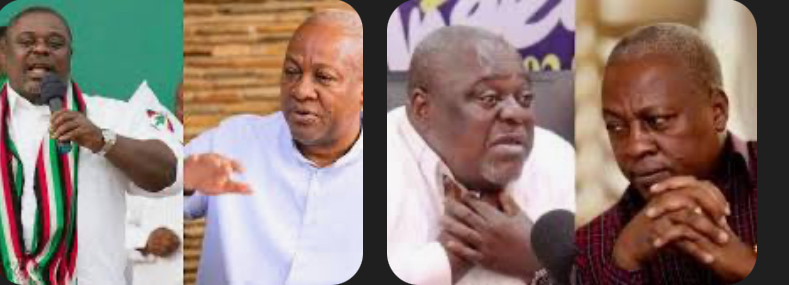
No Foreign Borrowing Now, Mahama assures
Sep 12, 2025
by Ekow Benyah Oct 06, 2025

October 6, 2025
Former Deputy General Secretary of the National Democratic Congress (NDC), Samuel Koku Anyidoho, has challenged President John Dramani Mahama to exercise his constitutional emergency powers to tackle Ghana's worsening illegal mining crisis, known locally as galamsey.
In a direct message posted on X (formerly Twitter), Mr. Anyidoho reminded the President that as Commander-in-Chief of the Ghana Armed Forces and head of the entire national security architecture, he has the constitutional authority under Article 31 to declare a state of emergency.
"We beg you, Mr President; please, you are in charge of National Security and Article 31 of Ghana's Constitution is screaming for you to use it," Anyidoho wrote, responding to President Mahama's recent comments about the conditions under which he would declare a state of emergency.
The appeal comes as pressure intensifies from various quarters—including civil society organizations, environmental activists, and concerned citizens—for more decisive action against illegal mining, which has devastated Ghana's water bodies, forests, and agricultural lands.
Speaking to civil society organizations in Accra on Friday, October 3, 2025, President Mahama explained that he acts on the advice of the National Security Council, which currently believes the galamsey fight can be won without declaring a state of emergency.
"The president acts on the advice of the National Security Council. The National Security Council believes we can win the fight without a state of emergency. The day they advise me otherwise, I will not hesitate in declaring," the President stated.
However, Mr. Anyidoho's intervention suggests that some within the President's own political tradition believe the situation has deteriorated to a point where emergency powers may be necessary, regardless of the National Security Council's current assessment.
During the same address, President Mahama outlined several measures his administration is implementing to combat illegal mining, including the registration and licensing of all excavators operating in the country.
"Every excavator must be registered with the owner known," the President declared, adding that this measure would help in tracking those involved in galamsey activities.
The President also issued a stern warning to shipping lines, threatening penalties for companies that bring excavators into Ghana without proper permits.
"We shall penalise you for carrying those excavators here to Ghana without a permit," he warned, signaling the government's intention to cut off the supply chain that enables illegal mining operations.
The Minister of Lands and Natural Resources, Emmanuel Armah-Kofi Buah, expressed optimism about the government's anti-galamsey efforts, praising President Mahama's leadership on the issue.
"We have made progress, and we are on the right path. What gives me confidence is the political will and the leadership that President Mahama is providing," Minister Buah said at the event with civil society groups.
The call for a state of emergency over galamsey has become a contentious issue in Ghana's public discourse. Proponents argue that:
However, critics and government officials counter that:
Article 31 of Ghana's 1992 Constitution grants the President emergency powers under specific circumstances. A state of emergency can be declared when there is a threat to the nation's security, public safety, or economic life.
Such a declaration would require parliamentary approval and would grant the President and security agencies enhanced powers to take measures deemed necessary to address the emergency situation.
Mr. Anyidoho's public appeal to President Mahama carries particular significance given his history with the NDC. As a former Deputy General Secretary of the party and a vocal commentator on national issues, his intervention reflects growing impatience even among some members of the President's political base.
This is not the first time Anyidoho has spoken out on the galamsey issue. He has previously called for the declaration of security zones rather than a full state of emergency, suggesting a middle ground approach to addressing the crisis.
The galamsey crisis has reached alarming proportions, with several of Ghana's major river bodies, including the Pra, Ankobra, and Birim rivers, severely polluted. The Ghana Water Company Limited has repeatedly warned about difficulties in treating water for public consumption due to the high levels of contamination.
Environmental groups have documented widespread forest destruction, farmland devastation, and displacement of communities in mining areas. The health implications of consuming contaminated water and food grown on polluted land have also raised serious public health concerns.
As the debate continues, all eyes remain on President Mahama and the National Security Council. The government faces the delicate task of demonstrating tangible progress against galamsey while addressing calls for more aggressive action.
The effectiveness of the excavator registration system and enforcement of penalties against shipping companies will serve as key indicators of whether the current approach can deliver results without resorting to emergency powers.
For now, Mr. Anyidoho's appeal adds to the chorus of voices urging decisive action, while reminding the President that constitutional tools exist to address national emergencies,if the political will exists to use them.

Sep 12, 2025

Oct 04, 2025

Oct 09, 2025

3 weeks ago

3 weeks ago

Sep 23, 2025

Sep 19, 2025

3 weeks ago